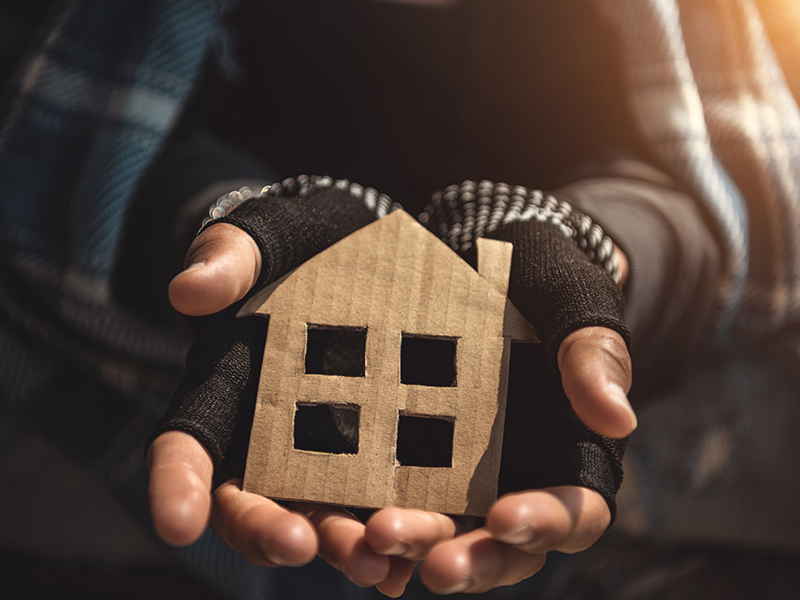The Injustice of the Unhoused
The Injustice of the Unhoused

The Center’s 2022-23 Dangerous Dialogue Series
By Erin Mills
It is unsettling to walk down the streets of just about any city in our nation and see so many unhoused neighbors sleeping in tents, on benches, and under bridges. And we know that for every unhoused neighbor we see, there are hundreds more we do not—those who sleep in their cars or on the couches of friends, or perhaps stay at work overnight because they have nowhere else to go.
We as a nation are struggling with what to do as too many people fall through the cracks of our failed social safety nets. Isaiah 58:7 calls us to share our food with the hungry; to provide the poor wanderer with shelter; when we see the naked, to clothe them; and not to turn away from our own flesh and blood. It reminds us that it is our responsibility as people of faith to address this seemingly insurmountable crisis. What can we do? What should we do?
These are the questions the Center for Social Justice and Reconciliation is exploring in its 2022-23 Dangerous Dialogue Series, “The Injustice of the Unhoused.” We opened the series on October 13, 2022, with regional and national leaders who are involved in the fight for housing justice and a conversation about both the historic and current housing landscape in our nation. Dr. Susie Shannon reminded us that housing injustice is rooted in racism and discrimination. In Los Angeles, for example, Black people are nine percent of the overall population but make up nearly 35 percent of the homeless community. She noted that we need to be honest about the fact that we do not have a meritorious system in the United States when it comes to employment; rather, we have a system that is largely based on wealth and contacts, making it very hard for people who have neither to get ahead.
Each member of our panel reminded us that being unhoused is a dehumanizing experience in which people are made to feel “less than” because of their situation. Joel Segal quoted a colleague when he said, “Behind every statistic are tears.” But there is hope. Every panelist agreed that there are solutions to this crisis. There simply isn’t the political will to put them in place.
So how do we move forward?
Our second and third conversations focused on the role of the interfaith community in addressing housing injustice and faith-based initiatives that have already been implemented and are working. While action is absolutely what the faith community is called to undertake, speaking out against housing injustice and reminding other groups of their responsibilities must also be part of that action.
“We are in the world to make a testimony on behalf of the Holy One,” Rev. Graylan Hagler noted, “and particularly to those government entities that need to be held accountable.” Rev. Glencie Rhedrick reminded us that God did not create us denominationally or in a particular faith understanding: “God created us as people.” As people, we must call others in and work together to rectify the injustice of the unhoused, remembering, in the words of Pastor Doug Smith, that “God loved us when we were most unlovable.”
The good news is that faith communities are answering the call and responding to this crisis. They are utilizing land they already own, creating land trusts, and bringing together members of the faith community in partnership with city and county officials and raising money to fund the development of affordable housing initiatives. In February, we spoke with Rev. Dr. Bob Henderson from Covenant Presbyterian Church in Charlotte, North Carolina; Rev. Dr. Peter Wherry from Mayfield Memorial Baptist Church in Charlotte, North Carolina; and Finny Mathew, President of the FARRR FOUNDATION and The Lighthouse Community Center of Lynchburg, Virginia. Each of these faith-based entities has undertaken the difficult task of tackling housing injustice head on, and, as was noted several times in our discussion, it is complicated space within which to work.
Groups who feel called to this ministry must begin by having conversations—with theologians, activists, and community leaders who are already on the ground—and pay close attention to the communities in which they are working. Rev. Dr. Henderson noted that two key decisions his group made early on were to surround themselves with people who were smarter than they were and to adopt a set of guiding principles for work in affordable housing, including supporting a bold vision, prioritizing children, and fostering congregational engagement.
Additionally, as we learned and discussed in our fourth conversation, “When Christ and Code Collide,” those who want to help must recognize that the path to housing the unhoused—particularly when creative approaches are explored—will rarely be a smooth one. It is critical that we as people of faith remember that the injustice of the unhoused is an intersectional issue in which many areas (e.g., disabilities, incarceration, race) must be considered and that we need, in the words of Rev. Dr. Rodney Sadler, “fusion solutions.”
As our “Injustice of the Unhoused” series continues, we are inspired by the words of Finny Mathew, who said of this difficult and profound work, “Jesus has already taught us how to do these things. We have an obligation.”
We hope you will join us as our monthly virtual conversations continue, beginning Thursday, May 18. Recordings of all Dangerous Dialogues are available on Union Presbyterian Seminary’s YouTube page under “Center for Social Justice and Reconciliation.”
Erin Mills serves as Program Associate at the Center for Social Justice and Reconciliation (CSJR). She has a Bachelor’s degree in Biology and Neuroscience from Davidson College, a Master’s in Clinical Psychology from UNC-Charlotte, and a Master’s in Christian Education from Union Presbyterian Seminary. She served as the Youth Director of Selwyn Avenue Presbyterian Church in Charlotte for eight years and is currently an Elder there. She volunteers and serves on the Board of Directors for the Carolina Refugee Resettlement Agency and lives in Charlotte, North Carolina, with her husband, Roger, and their three children.

